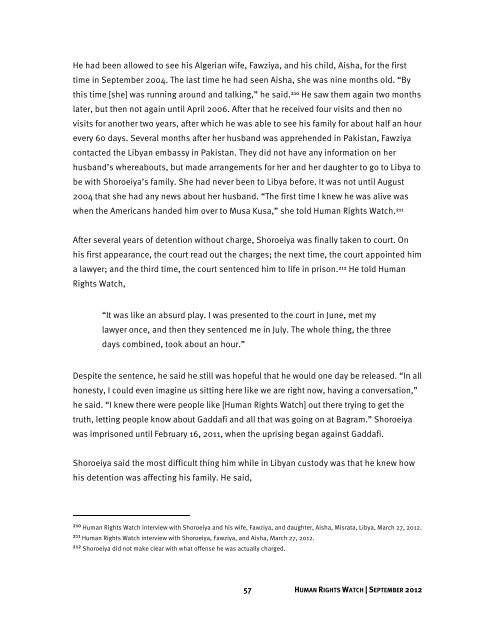Delivered Into Enemy Hands - Human Rights Watch
Delivered Into Enemy Hands - Human Rights Watch
Delivered Into Enemy Hands - Human Rights Watch
Create successful ePaper yourself
Turn your PDF publications into a flip-book with our unique Google optimized e-Paper software.
He had been allowed to see his Algerian wife, Fawziya, and his child, Aisha, for the first<br />
time in September 2004. The last time he had seen Aisha, she was nine months old. “By<br />
this time [she] was running around and talking,” he said. 210 He saw them again two months<br />
later, but then not again until April 2006. After that he received four visits and then no<br />
visits for another two years, after which he was able to see his family for about half an hour<br />
every 60 days. Several months after her husband was apprehended in Pakistan, Fawziya<br />
contacted the Libyan embassy in Pakistan. They did not have any information on her<br />
husband’s whereabouts, but made arrangements for her and her daughter to go to Libya to<br />
be with Shoroeiya’s family. She had never been to Libya before. It was not until August<br />
2004 that she had any news about her husband. “The first time I knew he was alive was<br />
when the Americans handed him over to Musa Kusa,” she told <strong>Human</strong> <strong>Rights</strong> <strong>Watch</strong>. 211<br />
After several years of detention without charge, Shoroeiya was finally taken to court. On<br />
his first appearance, the court read out the charges; the next time, the court appointed him<br />
a lawyer; and the third time, the court sentenced him to life in prison. 212 He told <strong>Human</strong><br />
<strong>Rights</strong> <strong>Watch</strong>,<br />
“It was like an absurd play. I was presented to the court in June, met my<br />
lawyer once, and then they sentenced me in July. The whole thing, the three<br />
days combined, took about an hour.”<br />
Despite the sentence, he said he still was hopeful that he would one day be released. “In all<br />
honesty, I could even imagine us sitting here like we are right now, having a conversation,”<br />
he said. “I knew there were people like [<strong>Human</strong> <strong>Rights</strong> <strong>Watch</strong>] out there trying to get the<br />
truth, letting people know about Gaddafi and all that was going on at Bagram.” Shoroeiya<br />
was imprisoned until February 16, 2011, when the uprising began against Gaddafi.<br />
Shoroeiya said the most difficult thing him while in Libyan custody was that he knew how<br />
his detention was affecting his family. He said,<br />
210 <strong>Human</strong> <strong>Rights</strong> <strong>Watch</strong> interview with Shoroeiya and his wife, Fawziya, and daughter, Aisha, Misrata, Libya, March 27, 2012.<br />
211 <strong>Human</strong> <strong>Rights</strong> <strong>Watch</strong> interview with Shoroeiya, Fawziya, and Aisha, March 27, 2012.<br />
212 Shoroeiya did not make clear with what offense he was actually charged.<br />
57 HUMAN RIGHTS WATCH | SEPTEMBER 2012
















